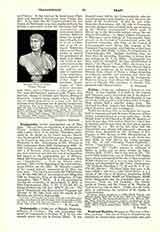

Tralles, a titular see, suffragan of Ephesus in Asia Minor. It was founded, it is said, by the Argians and Thracians, and is situated on one of the slopes of Mount Messogis in the valley of the Meander; it was one of the most populous and richest cities of Lydia. King Attalus had a splendid palace there. The local god was Zeus Larasios, but Apollo Pythius and other divinities were also worshipped.
Tralles was destroyed by an earthquake but was rebuilt by Augustus and took the name of Caesarea. Christianity was introduced at a very early date. In his famous letter to the Church at Tralles, St. Ignatius of Antioch says that their bishop, Polybius, visited him at Smyrna, and he puts them on their guard against Docetism (q.v.). We see by this letter that the Church there was already well organized. Among its bishops were: Heracleon, in 431; Maximus, in 451; Uranius, in 553; Myron, in 692; Theophylactus, in 787; Theophanes and Theopistus, in the ninth century; John, in 1230 (Revue des etudes grecques, VII, 80). In 640 (“Ecthesis Pseudo-Epiphanii”; Gelzer, “Ungedriickte…. Texte der notitiae episcopatuum”, 537) Tralles appears as suffragan of Sardes in Lydia, and we know, despite Le Quien (Oriens christ., I, 697), that it was such in 553. Towards 1270 Andronicus, son of Michael VIII Palaeologus, rebuilt and repeopled the city; it then numbered 36,000 inhabitants, but it was not long before it was retaken and demolished by the Turks (Pachymeres, “De Michaele Palrologo”, VI, 20 and 21, in P.G., CXLIII, 929-34). The Emir Aidin then gave it the name which it still bears, Aidin Guzel-Hissar; it is a sanjak of the vilayet of Smyrna, numbering 40,000 inhabitants, of whom 28,000 are Mussulmans, 10,000 Greek Schismatics, and the remainder Jews or Armenians. There are 120 Catholics. The Mechitarists of Vienna and the Sisters of St. Vincent de Paul have two schools there. Tralles was the birth-place of Anthemius, the architect of St. Sophia of Constantinople.
S. VAILHE

